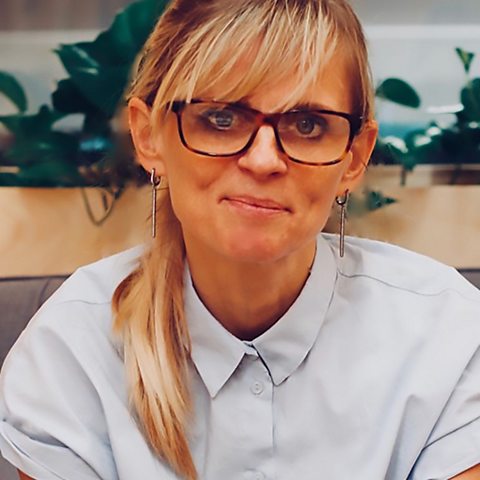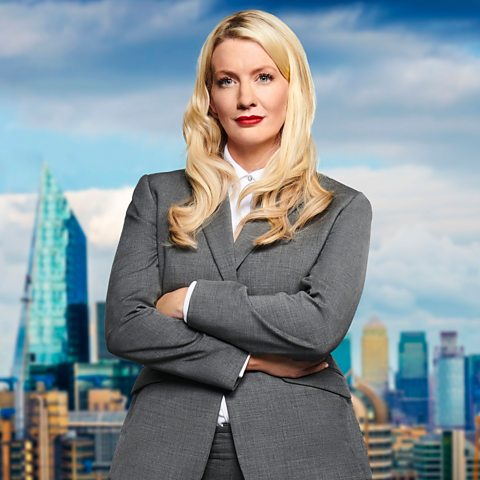
First off, what on Earth does USP actually mean? Well, it stands for ‘unique selling point’ and can be used to explain a characteristic of a product, service, business, or even a person – because we are all, after all, unique!
We each have specific features, skills or experiences that help us stand apart from the competition (your 'magic sauce'!). If you’re not sure of yours, see our guide 7 steps to ‘owning’ your personal brand.
Those watching BBC One’s The Apprentice will know all too well that the candidates are trying to demonstrate and shout about their USPs. They each need to make an impact and stand out in a crowded room of premium business-wear. They are trying to make an impression not only for their potential business partner, Lord Sugar, but also to make their mark as a memorable character on the programme.
Our expert Lizzie Hodgson is a global consultant on tech, media, marketing and society with a specific focus on the under 30’s. Lizzie’s here to make sense of the sound bites and explain how their one-liners could be backed up and demonstrated in business in a positive way.
Meet the remaining candidates in the world’s hardest job assessment:


Carina
Proudly claiming the label ‘pocket-rocket’, Carina wants to let people know thatall 5 foot 1 of her isn’t here for any nonsense.
What it means: Carina is keen to project her personality beyond her appearance. Even though she’s drawing attention to her height, her use of the term ‘pocket rocket’ is a great way of saying ‘don’t judge me on my stature, judge me on what I do’. That said, the ‘doing’ has to match up with the drive, so Carina is going to have to demonstrate that she knows how to deliver in business, without crashing and burning.

Dean
‘I’ve definitely got the gift of the gab’ confident Dean says of himself, as well as describing himself as being a ‘pure-bred entrepreneur’ from a very young age.
What it means: Dean considered himself as a winner from the off. If he isn’t crowned the The Apprentice, while it might bruise his ego, the experience will drive him on. By projecting a confident image, he’s saying ‘whatever life throws at me, I’ll manage’. The challenge? Dean has to ensure that he doesn’t ‘talk’ his way into (or out of!) sticky situations, especially in a world where authenticity is becoming increasingly important.

Iasha
Describing herself as ‘the star that shines the brightest’ Iasha also says she wishes she could be less driven!
What it means: By referring to herself as a brightly shining star, Iasha clearly believes in herself. However, despite her confidence, she’s also reflective. This is a very important trait in business: Iasha recognising that she can be a bit too driven indicates that she needs to find a balance. The question is whether she’ll find it in time. Will her drive come at the expense of a more measured approach to the challenges that she’ll face?

Jemelin
Jemelin strongly asserts that she ‘never has problems, only solutions’. She's also said 'cut me and I bled ambition' - Blimey!
What it means: Jemelin is clearly a very positive thinker. But more than that, she’s keen to position herself as the ultimate ‘doer’. While this is a really strong mentality to have, it’s not always the most realistic in business. If you don’t interrogate your challenges (or problems) properly, you risk simply glossing over them… Instead, you could consider them through a different lens, viewing them as important learning points from which you can build better and stronger outcomes - rather than dismissing them as ‘problems’ that need to be ‘solved’.

Riyonn
Riyonn claims his ‘poker face tactics’ are his ace up the sleeve that always help him succeed.
What it means: A ‘player’, Riyonn is someone who more likely than not considers business as a complex game - but with very high stakes. The reference to the ‘ace up his sleeve’ also indicates that he’s prepared to play the game on his terms. As an entrepreneur, this approach can be really powerful. But a word of caution:people tend to remember those who don’t ‘play fair’ in all walks of life, so reputation-wise, Riyonn should take care not to pursue success at the expense of others.

Lottie
Lottie believes her unique qualities bring ‘class’ to everything she does, and with superior ‘poise’ she can out-persuade the other candidates.
What it means: Lottie is another candidate with a very strong sense of self-value. That said, even by her own language, Lottie is positioning herself as ‘above’ others, which could backfire. While the participants in The Apprentice are all going for one single job, they will inevitably discover that by working collaboratively, and positively drawing on each others distinct strengths and characteristics, they have a greater chance of being successful.

Souleyman
Gold medal paralympian Souleyman is no stranger to winning big and he puts it down to his attitude of ‘why try at all if you’re not going to do it properly?’
What it means: Souleyman’s description of himself is one based on reality. As a Paralympic gold medalist, he’s already proven that he’s a very determined and capable candidate. His attitude of ‘do it properly’ is a great lesson to all of us: Projecting drive is one thing, but evidencing it makes it authentic.

Lubna
Lubna is proud of her roots and clear about where she is headed. In her words: ‘I came from a council estate… I have made myself into something good and I’m on my way to becoming something great.’
What it means: Lubna has carved out a path for herself, and acknowledges that she’s on a journey - one that she’s excited and believes in. What’s more, her background and experience has given her the foundations on which to build, a sentiment that many will find inspiring and valuable.

Thomas
Bold as brass Thomas isn’t shy to follow his instincts – ‘I don’t plan – I just do everything on impulse. When I plan, I always get it wrong.’
What it means: There are two halves to Thomas’ description of himself. On the one hand, he’s advocating the using ‘instincts’. Of course, this can be a really useful skill in business: decisions sometimes have to be made quickly and it takes confidence as well as taking personal responsibility for the outcome, whatever that may be. But on the other hand, what if you don’t have the adequate experience to make the right decision? Instincts in business are also built up over years, which is why we still need to plan, and learn and develop. And not annoy our colleagues by ‘going it alone’.

Marianne
Marianne insists she’s not one to be overlooked, and as a ‘dark horse’ warns that the other candidates should be wary not to ‘judge a book by its cover’.
What it means: In the workplace, there should be room for diverse range of people, each with varying characteristics, backgrounds and personalities. By saying that candidates shouldn’t take her on face value, Marianne is effectively saying ‘I do things differently’. A powerful sentiment, and one that many an entrepreneur will relate to… The important part in business is how we integrate difference to ensure everyone thrives.

Lewis
The week one project manager for the boy’s team, Lewis isn’t afraid of showing his inner child, or referring to himself in the third person: ‘Lewis is a guy who doesn’t want to grow up’.
What it means: Having a youthful, vibrant outlook on life is no bad thing. You’re more likely to innovate and adapt to new ways of thinking and working, and if you run a business, less likely to stagnate. But there is a big difference between that and not wanting ‘to grow up’. The fact is, we all grow up. It’s life. And that’s incredibly exciting: we get to build up diverse experiences over the years, and better still use those experiences in the real world. What’s not to love?

Scarlett
The first project manager for the girl’s team, Scarlett insists her list of achievements is a result of people ‘buying into her as a person’ and believes ‘where your emotions go your energy will flow’.
What it means: We know that ‘people’ make successful businesses, which is what Scarlett is pretty much saying here. The success of a company isn’t just down to how many units you sell, it’s also about the culture. For many years, the general culture in business was that you should never show your emotions or bring your personal life into work. Thankfully, times are changing and companies are increasingly aware of the value of positive mental health in the workplace. In other words, happier employees make for more successful businesses. Good job all round.

Ryan-Mark
‘I am the epitome of luxury. I am the David Dickinson of business.’ 19 year old Ryan-Mark also characterises himself as old beyond his years – ‘A 60-year old trapped in a teenager’s body’.
What it means: Perhaps Lewis and Ryan-Mark should swap notes…While it’s great to see a young person embrace maturity, there is something to be said about not growing up too fast. Take your time and be open to new opportunities, especially if you don’t quite know what your ‘thing’ in life is. Now, the interesting thing about Ryan-Mark’s self-description is that he relates to the highly charismatic TV personality, David Dickinson. The question that needs to be asked is that because of David’s vast experience in the world of antiques, built up over decades, or just his style? If it’s the latter, Ryan-Mark will need to work hard and prove he’s worthy of his self-proclaimed maturity during the challenges, and inevitably Alan Sugar’s boardroom.

Pamela
'I love to be the under-estimated person in the room,' claims Pamela, in stealth-sales mode!
What it means: A bit of reverse psychology by Pamela! Instead of hyping herself up too much, she’s taking a more strategic line by creating a sense of curiosity about her style and approach to business. While this is smart in the early days - Pamela isn’t necessarily setting herself up for an immediate fall - she’s still got toprove herself. When you position yourself as being ‘under-estimated’ the expectation is that at some point you’re going to have to deliver. And deliver big.
7 steps to 'owning' your personal brand
Learning how to define, polish and promote your personal brand with Bitesize.

Business buzzwords: Decoded
Blue sky thinking? Circling back to flag the issue? Bitesize decodes some business buzzwords to help you stay on top!
